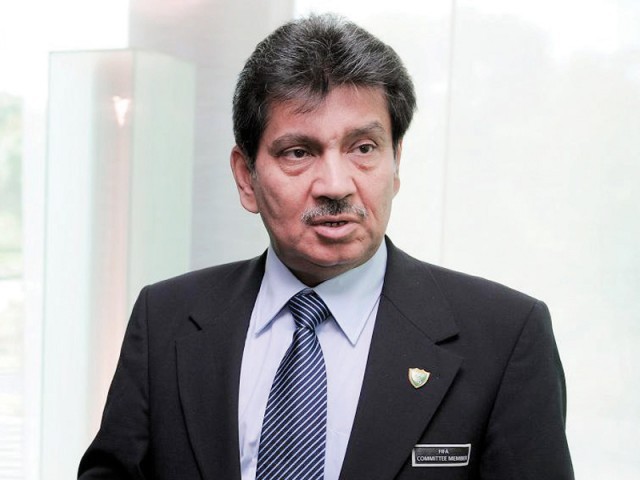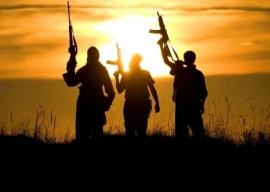
“The PPP was denied Punjab, and they [establishment] appointed their handpicked person, Nawaz Sharif, as chief minister of the province. Not only that, Sharif was also given the mandate to breathe fire at the PPP,” Hayat recalls.
The PPP remained defiant. The party decided to confront the establishment. The government managed to replace ISI chief General Hameed Gul with a retired general, Shamsur Rehman Kallu. It was the first time in Pakistan’s history that a civilian – retired general – was made the head of the country’s premier military intelligence agency. And according to Hayat, Gen (retd) Naseerullah Babar, the then special assistant to the prime minister, was instrumental in this unusual change.
“With Gen (retd) Kallu in the saddle, ISI’s political cell became dormant. Everything was shifted to the MI [Military Intelligence]. Now, the MI was cooking up everything against us [PPP]. Result: several scams surfaced. Asif Zardari’s corruption became talk of the town – and subsequently then president Ghulam Ishaq Khan dismissed our government,” claims Hayat. “[Then army chief] General Aslam Baig was part of this conspiracy.”
Read: Politics and conflict

Interestingly, it was Hayat who later successfully maneuvered on Benazir’s behalf in the late 1990s to enlist the establishment’s support to save the PPP from the ire of the Nawaz government.
Snap elections in the 1990 brought Nawaz back into power in the Centre. Former prime minister Muhammad Khan Junejo, tested by the establishment in 1984, was elected to parliament but was sidelined. Hayat says Sharif’s ascendency was baffling since common perception was that then caretaker prime minister Ghulam Mustafa Jatoi was the ideal choice of the establishment for the most coveted slot.
However, the budding political romance proved short-lived. Sharif failed to reconcile with Ishaq Khan and the establishment. And as a result Sharif’s government was also sent packing. By then, Hayat recalls, the PPP had learnt its lesson. The party shed its anti-establishment policy.
“After her first government was dismissed, Benazir’s approach witnessed a transformation. Now, she believed we would have to go along with the establishment. The PPP became part and parcel of the establishment plots. The party announced a long march to show its street power. When Sharif was forced by the establishment to step down in 1993, the PPP was part of that conspiracy,” Hayat claims.
The subsequent mid-term election brought the PPP back into power. Benazir was, however, unlucky. Her second stint in power also ended abruptly after her own handpicked president, Farooq Leghari, dissolved the assemblies over personal differences with her spouse, Asif Zardari.
Read: Power politics in the Middle East
General elections were held in 1997 – and Sharif’s party was voted to power with a heavy mandate: two-thirds majority. By that time, Sharif had become even bitter in his vendetta against the PPP. Hayat says that he was assigned by the PPP chairperson to seek help from Lt Gen Naseeem Rana, then ISI chief, to extricate PPP leaders from Sharif’s Eitesab Commission, led by Saifur Rehman. “These meetings, however, did not bring any relief for the beleaguered party.” Zardari and many prominent figures in the PPP, including Hayat, were detained on corruption charges.
However, Nawaz fell out of favour with the establishment shortly. And his government was toppled by then army chief General Pervez Musharraf in a bloodless coup in October 1999. Musharraf, who held the Constitution in abeyance, called general elections in 2002. Hayat says he was among a handful of interlocutors who negotiated with the Musharraf-led establishment before the elections. Hayat recalls several meetings with then ISI chief General Ahsanul Haq. Following the 2002 elections, Benazir was given a lucrative offer to join a coalition government: office of the speaker, half of cabinet portfolios and provincial government in Sindh – the coveted office of prime minister was to go to the ‘king’s party’ – the PML-Q of the Chaudhrys of Gujrat.
Musharraf did not favour the immediate return of Benazir, who was in self-imposed exile. Zardari was still in jail on corruption charges. Hayat says that he and some others in the PPP insisted Benazir return to Pakistan even at the risk of being sent behind bars – but she remained reluctant. “She wanted a wholesome package. She said either Musharraf cut a deal with her or there would be no deal at all,” Hayat says. The 2002 elections brought in a hung parliament as no party could win simple majority to form a government. After Hayat and his colleagues failed to convince Benazir to come back, they met her in Dubai and told her that they were parting ways with the PPP. This disgruntled group of PPP leaders formed PPP-Patriots and helped PML-Q nominee Mir Zafarullah Jamali to become prime minister by a razor-thin margin of one vote.
Published in The Express Tribune, October 12th, 2015.

1732274008-0/Ariana-Grande-and-Kristin-Chenoweth-(1)1732274008-0-165x106.webp)





1732270499-0/Express-Tribune-(7)1732270499-0-270x192.webp)
1732267715-0/BeFunk_§_]__-(32)1732267715-0.jpg)

1732263788-0/BeFunk_§_]__-(30)1732263788-0.jpg)






COMMENTS (3)
Comments are moderated and generally will be posted if they are on-topic and not abusive.
For more information, please see our Comments FAQ